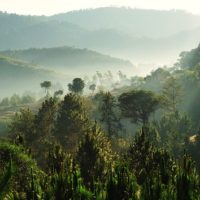
(ANTANANARIVO, Madagascar) — The ramifications of human activity on the island of Madagascar will affect the island far longer than previously realized, scientists say.
It could take millions of years for the biodiversity on the island to recover from extinctions spurred by human activity, according to a study published Tuesday in Nature Communications.
The island is home to a plethora of unique animal species, including the Madagascar sucker-footed bat, an ancient family of bats that is found only on Madagascar; the lowland streaked tenrec, from a diverse group of mammals found only on Madagascar; the world’s smallest chameleon; the fossa; and the ring-tailed lemur.
At least 17 species of lemurs have already gone extinct on the island, and several other species are threatened with extinction due to human influences such as deforestation, hunting and climate change, according to the study.
Researchers from the U.S., Europe and Madagascar sought to quantify the extent to which humans have disrupted the fauna of Madagascar and forecast future outcomes, assembling a comprehensive dataset of 249 living and recently extinct mammals, including species that disappeared shortly after humans first arrived on the island, such as giant lemurs and dwarf hippos.
The scientists then combined that data with evolutionary history of species and statistical models of their geographical distribution over time.
The impacts were much greater than scientists expected, Luis Valente, author and researcher at the Naturalis Biodiversity Center and the University of Groningen in the Netherlands, told ABC News.
The researchers found that it could take 3 million years for Madagascar to recover the species that have been lost since human arrival if current threats are not mitigated, the study states.
In addition, it could take more than 20 million years to recover if currently threatened species are lost as well, the researchers said.
“We knew that there’s a lot of species that are threatened in Madagascar, but we didn’t expect it to be such a long timescale that it would take to recover them,” Valente said.
Even bat species, which can colonize islands more easily than non-flying mammals, may need about 3 million years to recover, according to the paper. The number of Madagascar’s mammal species threatened with extinction has increased dramatically in the past decade, from 56 in 2010 to 128 in 2021.
The timescale, termed “evolutionary return time,” will take longer than other island nations because the human impact has been limited in comparison to a place like New Zealand, Valente said. Although humans first arrived on Madagascar about 2,500 years ago, the bulk of the damage from human expansion has been done in the past 100 years, leaving much of the island’s forests in pristine condition, he added.
Essentially, because Madagascar is “catching up” to other island nations in terms of detrimental human activity, it stands to lose a lot more in the future, Valente said.
“The amount of history we stand to lose on Madagascar is larger than in any other system that we’ve looked at,” Valente said.
Deforestation for the purpose of planting crops has been the main culprit of human expansion over the last century, but communities are also beginning to encroach farther into forests to hunt bushmeat, such as lemurs, Valente said. Combined with climate change, the longevity of many species on the island is at risk.
The findings suggest that immediate conservation efforts are needed to avoid long-lasting biodiversity losses, including programs that include socio-economic improvements for local human populations, reducing forest loss in the remaining natural habitats and limiting artisanal and commercial resource exploitation, such as of hardwoods and animals for the bushmeat trade, the scientists said.
The expansion and enforcement of protected areas will be necessary as well, Valente said.
Without timely conservation actions, the biodiversity of Madagascar could be impacted for millions of years, the scientists said.
Copyright © 2023, ABC Audio. All rights reserved.















